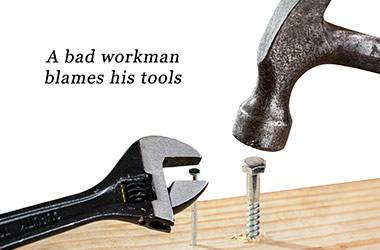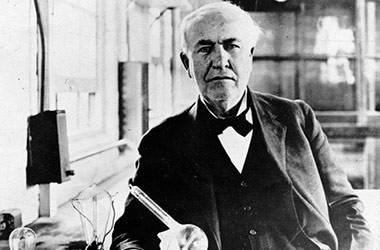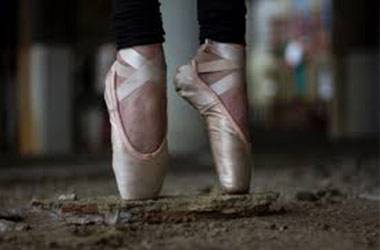Taking Responsibility for Your Own Mistakes

Do you have what it takes to be a good student?
Do you have what it takes to be a good student? Or do you blame your teacher or the books if you don't get good grades? If your answer to the second question is "Yes", then the answer to the first question is a "No".
"A bad workman always blames his tools"
“A bad workman always blames his tools” is an old adage which surfaced sometime in the 13th century or earlier. As the sentence implies, it criticises a person who always puts the blame on other people or things for his or her own failure. Sometimes, we forget that it is not the tools we use which make us good, but rather how we employ them.
Making mistakes is inevitable; it is just how life is. Nobody is perfect and life does not always pan out the way we hope it will. But it has always been the default reaction of many people to find somebody or something else to blame for their misfortunes. When things happen, it is the result of many contributing factors caused by your own actions and those of others. But the tendency is that we always point the finger at others and not at ourselves.

"You don't need an expensive racket and shoes to play good tennis."
A tennis coach once said to his young children that they don’t need an expensive racket or tennis shoes to play good tennis. What they need is perseverance, hard work and discipline. The tennis shoes and racket are merely tools. This is exactly what the 19th century German philosopher Arthur Schopenhauer says: “If your life is difficult, in 99% cases it is because you didn’t work hard enough, you didn’t learn well enough, you didn’t live selflessly enough. And if you want to better your life, start learning well, working hard and living for reasons larger than your mortal self.”

Making Mistakes is Part of the Learning Process
Blaming others is always easier that admitting your own faults or shortcomings. You feel embarrassed or too proud to admit you are in the wrong. The truth is, you can spend your whole life blaming the world, but take note that your success and failures are, for the most part, your own responsibility.
The important thing that we forget is that learning is all about making mistakes first. It is through mistakes that we learn how to do things right. Thomas Edison made 1,000 unsuccessful attempts at inventing the light bulb. When he was asked by a reporter how he felt, to fail 1,000 times, he replied, “I didn’t fail 1,000 times. The light bulb was an invention with 1,000 steps.” Owning your mistakes and turning them into something positive does not dishonour you as a person. In fact, it elevates your standing as a brave and responsible person. Just like Thomas Edison.

If you can't dance, don't blame the dance floor
Being unable to take responsibility for our own mistakes and blaming others can cause damage in many different ways. Take the scenario in the first paragraph of this article. If you fail to see that you yourself have contributed to your own failure, you will never work harder or find your weakness in the subject and try to correct it. Shifting the blame onto someone else can cause a rift in relationship or loss of one’s respect. It really doesn’t make any sense when you don’t want to bruise your own ego by admitting your mistake, but you have no qualms in bruising another person’s honour by blaming him/her. It is best to do your own self-analysis, be humble and try to correct the mistakes. If you can’t dance, go and learn how to dance. The floor will not change no matter how much you blame it. And you will continue not to know how to dance if you don’t do anything about it.
WUP 2/8/2020
by Hanna Abdelwahab
©WUAS Press